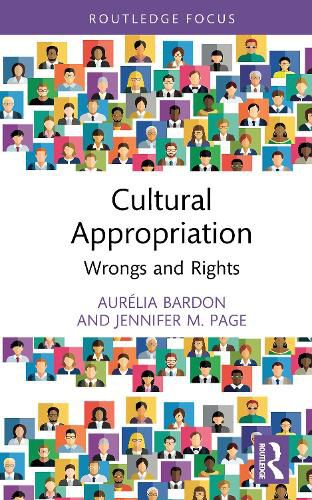Readings Newsletter
Become a Readings Member to make your shopping experience even easier.
Sign in or sign up for free!
You’re not far away from qualifying for FREE standard shipping within Australia
You’ve qualified for FREE standard shipping within Australia
The cart is loading…






From the fashion label Dior being accused of cultural appropriation after using American Indian imagery in an ad campaign for its "Sauvage" fragrance, to the backlash against Kendall Jenner's afro-esque hairstyle in Vogue, debates about cultural appropriation have reached a fever pitch. In this much-needed analysis of the phenomenon Aurelia Bardon and Jennifer Page step back and ask: when is cultural appropriation wrong and when are we right to criticize it?
Their analysis of wrongful cultural appropriation centers on three questions: whether appropriation involves theft; whether it communicates disrespect; and whether it disregards requests made by marginalized groups about their cultural practices. Sometimes, they argue, it is structural injustice rather than individual wrongdoing that is at stake. They examine cultural appropriation's political dimensions, asking whether the state should be neutral between appropriative and non-appropriative artistic expression. They contrast bans on wrongful cultural appropriation and the state's using its expressive power as a speaker, spender, and educator to discourage it. They also consider the ethical questions that arise when cultural appropriation debates spur further debates about online shaming and cancel culture.
Using cases from music, fashion and the arts, Cultural Appropriation: Wrongs and Rights will be of great interest to students and researchers in philosophy, politics and related subjects, such as race and ethnic studies, sociology, and cultural studies.
$9.00 standard shipping within Australia
FREE standard shipping within Australia for orders over $100.00
Express & International shipping calculated at checkout
From the fashion label Dior being accused of cultural appropriation after using American Indian imagery in an ad campaign for its "Sauvage" fragrance, to the backlash against Kendall Jenner's afro-esque hairstyle in Vogue, debates about cultural appropriation have reached a fever pitch. In this much-needed analysis of the phenomenon Aurelia Bardon and Jennifer Page step back and ask: when is cultural appropriation wrong and when are we right to criticize it?
Their analysis of wrongful cultural appropriation centers on three questions: whether appropriation involves theft; whether it communicates disrespect; and whether it disregards requests made by marginalized groups about their cultural practices. Sometimes, they argue, it is structural injustice rather than individual wrongdoing that is at stake. They examine cultural appropriation's political dimensions, asking whether the state should be neutral between appropriative and non-appropriative artistic expression. They contrast bans on wrongful cultural appropriation and the state's using its expressive power as a speaker, spender, and educator to discourage it. They also consider the ethical questions that arise when cultural appropriation debates spur further debates about online shaming and cancel culture.
Using cases from music, fashion and the arts, Cultural Appropriation: Wrongs and Rights will be of great interest to students and researchers in philosophy, politics and related subjects, such as race and ethnic studies, sociology, and cultural studies.